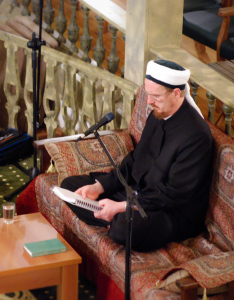The following is a succinct summary of the path to God. Sidi Ahmad Zarruq was very precise and logical in his exposition and this clarity is of much benefit in this age of confusion.
Foundations of the Spiritual Path (Source: Seasons Journal )
By Sidi Ahmad Zarruq Translated by Shaykh Hamza Yusuf
The noble scholar, the unique of his age, the regulator of the scholars and the saints, Sidi Ahmad Zarruq al-Barnusi al-Fasi, may Allah be pleased with him, wrote the following:
If anyone is asked about the foundations of his path, he should reply,
The foundations of our path are five:
• Taqwa – mindfulness of Allah, privately and publicly
• Adherence to the Sunna in word and deed
• Indifference to whether others accept or reject one
• Contentment with Allah in times of both hardship and ease
• Turning to Allah in prosperity and adversity.
The realization of mindfulness of Allah is through scrupulousness and uprightness. The realization of adherence to the Sunnah is through caution and excellent character. The realization of indifference to others’ acceptance or rejection is through patience and trust in Allah. The realization of contentment is through acceptance of what one is given and turning over the management of one’s affairs to Allah. The realization of turning back to Allah is through praise and gratitude in times of prosperity and taking refuge in Him in times of affliction.
The foundations of the preceding five are in the following five:
• Exalted aspirations
• Maintaining Allah’s reverence
• Expending oneself in excellent service of others
• Fulfilling one’s resolves
• Magnifying one’s blessings.
He whose aspirations are exalted is raised in rank. Allah maintains the respect of he who preserves His reverence. He whose service is for others is ennobled by it. He who does that which he resolves to do is assured continual guidance. He who deems blessings to be great by his own eye has shown gratitude. And he who is grateful ensures an increase in blessings from the Giver of gifts according to the promise of the Truthful One.
:The foundations of right conduct are five:
• Seeking sacred knowledge in order to fulfill Allah’s commands
• Keeping company with spiritual guides and the fraternity of aspirants to gain insight into one’s faults
• Foregoing dispensations and interpretations concerning injunctions for one’s own protection
• Organizing one’s time with the remembrance of Allah to maintain presence of heart
• Suspecting the selfish soul (nafs) in everything in order to free oneself from its whimsical desires and to be safe from destructive circumstances.
The pitfall of seeking knowledge is the company of sophomoric people, whether due to their age, intellect, or deficient religious practice – in other words, those who do not refer to sound principles of guidance in their actions. The pitfall of keeping company with the spiritual guides and the fraternity is elitism, deception, and self-righteous meddling in the affairs of others. The pitfall of foregoing dispensations and interpretations concerning injunctions is self-pity due to hardships. The pitfall of organizing one’s time with devotional works is ostentatious practice and ritualized perfunctory devotion.
The pitfall of constantly suspecting the selfish soul is inclining towards its upright states and goodliness, yet Allah says, “Were he to offer every kind of compensation, it would not be accepted from him” (Quran 6:70).
Moreover, the noble son of the noble one, Joseph the son of Jacob, peace be upon them both, says, in the Quran, “I do not say the selfish soul was free from blame. The selfish soul indeed commands to evil acts – except for those on whom my Lord has mercy” (12:53).
The foundations of what will cure the sickness of the soul are five:
• Moderation achieved by lightening the stomach’s intake of food and drink
• Taking refuge in Allah from harm when it actually occurs
• Vigilantly avoiding places where one fears misdeeds will occur
• Continually asking forgiveness of Allah coupled with devotional prayers upon the Prophet, peace be upon him, in both solitude and gatherings of people
• Keeping company with one who guides to Allah. Unfortunately, such a one no longer exists!
Abu Hasan Shadhili, may Allah be pleased with him, said, My beloved counseled me not to put my feet anywhere except where I hoped for Allah’s reward, not to sit anywhere except where I was safe from disobedience to Allah, not to accompany anyone except someone in whom I could find support in obedience to Allah, and not to select anyone for myself other than those who increased my certainty, and how rare they are to find! He also said, may Allah be pleased with him, Whoever directs you to this world has cheated you; whoever directs you to deeds has exhausted you; but whoever directs you to Allah has truly counseled you.
He also said, may Allah be pleased with him, Make piety (taqwa) your abode, and the delight of your selfish soul will do you no harm so long as it is discontent with its faults and does not persist in acts of disobedience nor abandons the awareness of Allah in solitude. I say that being content with the self, persisting in disobedient acts, and abandoning awareness of Allah are the foundations of all illnesses, tribulations, and pitfalls.
I have also seen that the seekers of this age are afflicted with five things:
• The preference of ignorance over Knowledge
• Being deluded by every spiritual impostor
• The inability to prioritize important matters
• Using the spiritual path as a means to inflate the selfish soul
• Attempting to expedite a spiritual opening without fulfilling its prerequisite conditions.
This has resulted in five other afflictions:
• Preferring innovations as opposed to the tried and true prophetic practice (Sunna)
• Following the people of claims and conceit as opposed to the truth
• Acting on capricious desires in all of their affairs, even the most celestial
• Preferring fantasies to realities
• The manifestation of claims without sincerity.
From these last five, five more have emanated:
• Obsessive compulsive thoughts in acts of devotion
• Laxity in matters of habitual practice
• Perfunctory devotional gatherings of invocation and chanting that lack inspiration
• Inclination toward people of rank and authority
• Companionship of those immersed in worldly matters, even mixing with the opposite sex and childish companions.
based upon far-fetched rationalizations they extrapolated from witnessing the like among real people of the path. They will even mention such people’s states and stations as a justification. On the other hand, had they had true enlightenment, they would have understood that seeking one’s provision is a dispensation for those lacking certainty, and that includes only the necessities of life without exceeding the necessary. Anyone lax in these matters is distant from Allah. As for devotional gatherings, they are permitted for people overpowered by their states or as a respite for people of excellent character. Indeed, such practice is akin to settling upon the carpet of truth if done in accordance with its requisite conditions among suitable people and in an appropriate place, not to mention fulfilling its required courtesies and protocols.
Obsessive-compulsive thoughts arise from innovation, the basis of which is in ignorance of the prophetic practice or in some psychological affliction. Any propensity toward creation is by nature the lack of such toward the truth. This is especially so coming from an obsequious chanter, a heedless tyrant, or an ignorant sufi. The company of the immature is harmful, as well as a worldly and otherworldly shortcoming, and an acceptance of such company even worse. Shaykh Abu Madyan said, “‘The immature’ means anyone who is not in conformance with the spiritual path you are on, even if it were someone who reached ninety years of age.”
I say the immature are those who are not firmly rooted in principle; they accept things at face value and are impassioned by them. The vast majority of such people are those who are pretentious in their associations with a spiritual group and prefer conversations to real spiritual work. Avoid them to the utmost of your ability.
Anyone who claims to have a station with Allah while any of the following five happen to emanate from him is either a liar or deluded:
• Allowing any of his members to fall into sinful disobedience
• Affectations in his devotional practice
• Expectations from the creation
• Backbiting against the people of Allah
• Lacking the proper respect for Muslims in accordance with the commands of Allah. Indeed, such people rarely die in a state of grace.
The qualifications of the spiritual guide with whom the seeker may safely entrust his self are the following five:
• Unadulterated spiritual experience
• Sound outward knowledge
• Celestial aspirations
• A pleasing state
• Penetrating inner perception.
Whoever has any of the following five cannot be a true spiritual guide:
• Ignorance of the religion
• Disregard for the reverence of other Muslims
• Engaging in matters of no concern to him
• Following his caprice in his affairs
• Unashamed displays of bad manners followed by lack of remorse.
The spiritual courtesies of a student with his or her spiritual guide and fellow wayfarers are also five:
• Following the directions of the guide, even if it is contrary to one’s own preference
• Avoiding what the guide forbids, even if it would appear to be highly adverse to the student
• Maintaining utmost reverence for them in their presence and absence, during their lives and after their deaths
• Giving them their due according to one’s ability without stint
• Relinquishing one’s own understanding, knowledge, and leadership to that of the teacher, unless these are already in accordance with one’s teacher.
Should the seeker not find a guiding teacher or find one who is lacking in any of these five conditions, he should depend on him only in those conditions the teacher fulfills. As for areas he is wanting in, he should treat him like a brother regarding them. Thus ends the five foundations with the praise, help, and perfect success of Allah.
It is necessary to read this every day, once or twice, and if that is not possible, then at least once a week until its meanings are imprinted on one’s soul and manifest in one’s behavior. Indeed, it contains that which enables one to dispense with many books and much advice, and it is said, “Surely they have been denied arrival by their neglect of the foundations.” Whoever reflects deeply on what we have said will acknowledge its truth, and he will continue to have recourse to it, using it as a reminder for him.
Success is ultimately by Allah.
[Translator’s note] In addition to the above work, there is a large portion about the path to Allah that appears in the great Imam Nawawi’s al-Maqaasid, which Sidi Ahmad Zarruq did not mention in his work; it is a wonderfully succinct summation of the path to Allah. Imam Nawawi, may Allah sanctify his secret, says….
The counsel of Imam Nawawi
[Translator’s note] In addition to the above work, there is a large portion about the path to Allah that appears in the great Imam Nawawi’s al-Maqaasid, which Sidi Ahmad Zarruq did not mention in his work; it is a wonderfully succinct summation of the path to Allah. Imam Nawawi, may Allah sanctify his secret, says,
One reaches Allah Most High by repenting from all things, unlawful or offensive;
seeking sacred knowledge in accordance with one’s needs;
maintaining ritual purity;
performing the obligatory prayers in the first of their time and in congregation, including the Sunna prayers that correspond to each of the obligatory prayers;
adhering to the eight raka’ats of the midmorning prayer (Duha) and the six raka’ats after the sunset prayer an before the night prayer;
Performing the night prayers (tahajjud) after awaking from one’s sleep; fulfilling the witr prayer;
fasting on Mondays and Thursdays and on the three days of the full moon – i.e. the 13th,14th, and 15th of the lunar month – and also the days of the year in which fasting is recommended;
reciting the Quran with the heart’s presence coupled with reflection upon its meanings;
frequently asking forgiveness of Allah (istighfar);
maintaining prayers and blessings upon the Prophet, peace be upon him; and, finally, adhering to the meritorious invocations of the morning and the evening that have come tous from the Sunna (adhkaar as-sabaah wa al-masa’).


